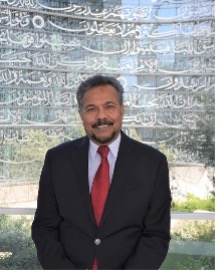
- 15 Sep 2021
Uncovering the Gatekeepers of Islamic Finance
 |
 |
This event is organised by MEI Diffusion of Ideas-Gulf research cluster in collaboration with the Centre for Islamic Economics and Finance, Hamad Bin Khalifa University (CIEF-HBKU)
Abstract
In this webinar, co-organised by MEI-NUS and the Centre for Islamic Economics and Finance, Hamad Bin Khalifa University (CIEF-HBKU), two industry experts will explore the sociological dimensions of Islamic finance and its institutions. The session seeks to introduce the audience to:
- The role(s) of Sharia supervisory boards (SSBs) in approving – or disapproving – financial products at Islamic financial institutions
- The religious, legal and business frameworks under which the SSBs operate
- The extent of legal and religious authority that SSBs have in making a resolution.
In that regard, some questions that will outline the discussion include:
- How do SSBs at financial institutions wield authority and influence in approving (or disapproving) financial products?
- What are the main similarities and differences between SSBs in Southeast Asia and the Middle East?
- Is it true that SSBs in the Middle East are more stringent than those in Southeast Asia, as some Islamic finance insiders claim?
- What are the socio-religious factors that could influence the fatwas (Islamic legal opinion) issued by an SSB on a particular financial product?
This public talk will be conducted online via Zoom on Wednesday, 15 September 2021, from 4pm to 5.30pm (Singapore Time) / 11am–12:30pm (Doha, Qatar time).
All are welcome to participate. This event is free, however, registration is compulsory. Successful registrants will receive a confirmation email with the Zoom details closer to the date of the event.
Photo by Artur Aldyrkhanov on Unsplash
Listen to the full event here:
Watch the full event here:
Read the Summary of Event Proceedings:
By Ilyas Salim
Research Assistant, Middle East Institute, National University of Singapore
Islamic finance is compliant with Islamic Sharia law which draws from three main references — the Quran, the Hadith (which are the words and deeds of the Prophet Muhammad) and the consensus of religious scholars (known as ijma’). Sharia finance is an emerging sector and in the past two decades, the number of Sharia-compliant banks and funds managed under Islamic finance has been increasing exponentially.
The main element that differentiates Islamic finance from conventional banking lies in the treatment of interest, which is considered usurious by the former. An avoidance of usury — known as riba — is among the highest fundamental objectives in Islamic finance. The other main requirement of Islamic finance involves the avoidance of contractural uncertainties, excessive speculation and financing for illicit or immoral purposes.
The demands of Sharia compliance means that an additional layer of governance is required for banks which practice Islamic finance. This duty is done by Sharia supervisory boards (SSBs), which act as independent oversight bodies that issue relevant Sharia pronouncements and resolutions. In determining whether transactions are permissible or impermissible, SSBs take into account aspects such as fairness and co-operation, equity, profit-sharing and overall promotion of societal good. The various Sharia rulings of individual Islamic financial institutions are sometimes compiled into a database for public access, although the sheer number of banks and rulings today has made this an increasingly difficult task. An audit committee, sometimes comprising an external agency, is also often formed to guide banks in complying with Sharia rulings as well as in other principles of Sharia governance. The results of the audit may be reflected in an annual Sharia compliance report, a practice observed by some institutions.
The Sharia pronouncements issued by Islamic financial institutions take the form of fatwas, or Islamic legal opinions, on the institutions’ operations, products and services. These rulings are a form of endorsement, proclaiming that the particular transaction is halal, or permissible. While Sharia is commonly referred to as Islamic law, Sharia rulings in Islamic finance may actually be non-binding; rather, they may serve mainly as a source for deriving ethical principles used in determining whether a transaction is permissible from an Islamic perspective, while the legal validity of the transaction is provided by another legal order (such as international law). In this framework, transactions carry Sharia risk, meaning that they may be challenged and regarded impermissible if they are found to be in violation of Islamic legal principles.
There is a variety of levels at which SSBs operate, depending on their roles. Internal Sharia boards work at the level of individual banks and institutions and serve to issue fatwas, supervision and audit functions. External Sharia boards may operate at the national level in some countries, in the form of centralised Sharia committees situated in either the national central bank or securities exchange commission. Islamic financial institutions may also seek the services of consultant Sharia boards on ad-hoc basis to seek advice on specific issues or products. Institutions lacking an in-house SSB may also seek consultant Sharia boards to conduct Sharia reviews and issue fatwas certifying that their products and services are Sharia-compliant. On the international level, the process of Sharia regulation may involve the co-operation of different governments or different Islamic financial institutions operating in different countries. The Accounting and Auditing Organisation for Islamic Financial Institutions, for example, works on an international level to draft Sharia standards and provide input on accounting and governance standards with the aim of harmonising the practice of Islamic finance.
Sharia committees typically consist of three to five members, although there are significant variations in their types, compositions and operations depending on the type of institution. The formation of Sharia boards is often mandated by the regulatory authority — such as the central bank — that issues the Islamic financial institution its license to operate or specified under the institution’s Articles of Association. In some jurisdictions where there is a strong centralised Sharia committee that provides supervision and guidelines regarding sharia compliance, Islamic financial institutions may not necessarily need to form their own SSB.
There are various types of Sharia governance systems, all performing different functions. In legally constructed regimes, the operations of Islamic financial institutions are determined by the national banking law and as such, there are no supporting SSBs at the national level nor at the level of the individual bank. All banks in Iran, for instance, are governed by the Usury-Free Banking Act established in 1983 and are thus Islamic, according to law. Passive Sharia governance regimes may possess Islamic banking laws, although there are still active SSBs operating in individual Islamic financial institutions. While such regimes — typified by countries such as Kuwait and the UAE — may have a national Sharia authority based at the central bank, the role of this authority is either limited or ambiguous. Robust Sharia governance regimes possess Islamic banking laws that provide clear guidelines for individual SSBs as well as for the national Sharia authority. Examples include countries such as Malaysia and Indonesia, which have dual banking systems. Finally, in market-driven Sharia governance regimes, there are no Islamic banking laws to provide guidelines for Islamic financial institutions. As such, the nature of Sharia governance in such an environment is determined by the market and individual Islamic financial institutions will often form their own SSBs in response to market demand and pressures.
Various criticisms and sociological issues have been raised regarding the nature and operation of Sharia governance and SSBs. Sharia governance has been criticised for prioritising form over substance, given its tendency to focus on strict contractual obligations as well as the fact that it derives religious information mainly from the field Islamic jurisprudence (fiqh), whilst overlooking other fields such as Tauhid and Tasawwuf, which are better-suited to examine the underlying logics behind Islamic laws. SSBs may also face a conflict of interest, since they act as gatekeepers in-charge of ensuring Sharia compliance in institutions, yet remain accountable to these very institutions that pay for their services. Critics have also pointed to the monopolistic dominance of an exclusive group of Sharia scholars who serve on the SSBs of dozens of Islamic financial institutions worldwide. Gender diversity is also an issue, given that Sharia scholars are mostly men. The phenomenon of ‘fatwa shopping’ has also been criticised, wherein Islamic financial institutions rely on preferred SSBs to issue favourable fatwas to rubber-stamp management decisions. Lastly, the relationship between the state and Sharia governance organisations can cause complications, as the process of Sharia governance can end up being deeply entangled with the state’s agenda.
Highlights from the Q&A Session
During the Q&A session, a key thread of discussion revolved around the comparisons and interactions between Islamic banking and the conventional finance world. Can non-Muslims participate in Islamic finance? What are the advantages of investing in Islamic products and banks, especially for non-Muslims? In the event of conflicting local and Islamic laws, which one takes precedence in Islamic finance?
Mr Nuzaihan said that while there is a popular perception of Islamic finance being mainly for use by Muslims, it is in fact open to both Muslims and non-Muslims alike. Initially, it was difficult for Islamic products to offer a value proposition competitive with other financial products on the market but today, the emergence in environmental, social, and corporate governance (ESG), as well as values-based investing (VBI) means that more people are interested in ensuring that their investments are used for principled and socially responsible purposes — a fundamental consideration within Islamic finance. As such, Mr Nuzaihan noted that figures for Islamic finance are increasing year on year, as more non-Muslims in Southeast Asia are utilising Islamic financial solutions.
Dr Ali said that the issue of Islamic law vs local law is a common one in the industry and a natural result of the interactions between Sharia lawyers and the financial engineers or institutions that develop the financial contracts. However, ultimately, local law takes precedence over Islamic law and Islamic financial products and services must comply with local laws. Dr Ali also noted that there are many lessons Islamic financial institutions can draw from conventional finance. As an emerging market, Islamic financial institutions often lack the professionalism of conventional banks in terms of reporting and transparency standards. Islamic financial institutions also often lack a dedicated economic department to provide an economist’s perspective on financial matters. Lastly, Dr Ali recommended that Islamic financial institutions follow the example set by large conventional banks (such as Citibank and HSBC) in allocating a part of their profits to establish foundations to work on social issues.
About the Speakers

Director,
CIEF-HBKU
Mr Muhammad Nuzaihan Bin Hamdan
Associate Director,
CIMB Islamic Head,
Shariah Singapore
[Moderator] Fauzan A Roslee
Research Associate,
MEI (NUS)
Dr Syed Nazim Ali is the Director of the research division at the Center for Islamic Economics and Finance, College of Islamic Studies, Hamad Bin Khalifa University, Qatar Foundation.
Dr Ali has spent the last 30 years spearheading research in Islamic finance and faith-based initiatives in finance. He was the acting executive director of the Islamic Legal Studies Programme (2010–2013) at Harvard Law School and founding director of the Islamic Finance Project at Harvard University since its establishment in 1995. He has played the lead role in organising several conferences such as the Harvard University Forum on Islamic Finance (1997–2014), the annual workshop and public lecture on Islamic Finance at London School of Economics (2007–2017) and the annual School of Oriental and African Studies (SOAS) workshop in London (2018 to date).
He has also published several articles in refereed journals and monographs including Fintech, Digital Currency and the Future of Islamic Finance and Fintech in Islamic Finance: Theory and Practice and Shari‘a Compliant Microfinance. Dr Ali received his PhD from the University of Strathclyde, Glasgow.

Mr Muhammad Nuzaihan Hamdan is the Head of Shariah Singapore and Associate Director of CIMB Islamic and Treasury & Markets at CIMB Bank Berhad. At Shariah Singapore, he provides Shariah advisory for all types of Islamic products to CIMB Group of companies ( including overseas branches in London, Brunei and Hong Kong) as well as external parties in the Islamic debt capital market, asset and fund management, investment and corporate banking, retail and business banking, treasury and structured products, Takaful and private equity. His involvement in notable deals in Singapore include Sukuk issuances by the Islamic Religious Council of Singapore (MUIS), Sabana REIT, City Developments Limited and growing CIMB Bank Berhad’s Islamic financing and deposit to reach S$2 billion.
He also provides training on Shariah and Islamic Banking and Finance to CIMB Group staff (such as Accelerated Universal Banker) and was actively involved in preparing the Shariah e-learning courseware for CIMB Group. He holds a Master of Arts (with Distinction) in Islamic Banking, Finance and Management from Loughborough University, United Kingdom and a Bachelor degree (with Distinction) in Sharia (Islamic Studies and Jurisprudence) from Kuwait University.

[Moderator] Mr Fauzan A Roslee has a MA in Southeast Asian Studies from the National University of Singapore and a BA from the International Islamic University Malaysia, where he majored in Usuluddin (Islamic theology and philosophy) and minored in political science. He worked as a research officer at the ISEAS-Yusof Ishak Institute and prior to that was a research editor with Dow Jones Risk and Compliance.




